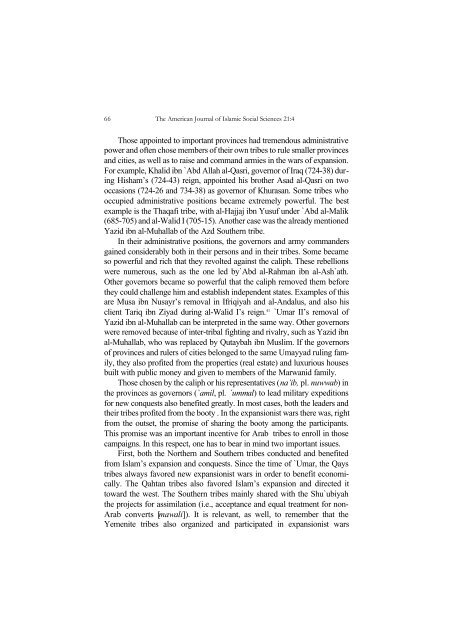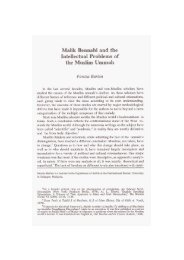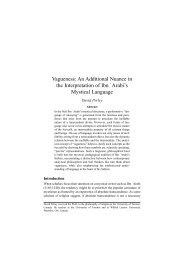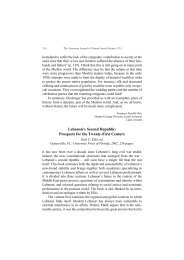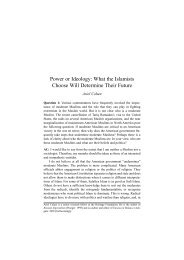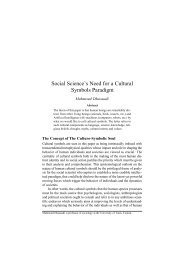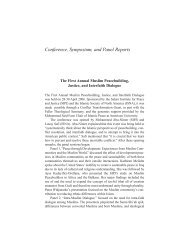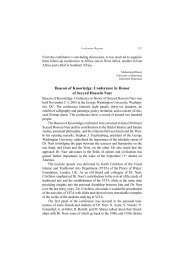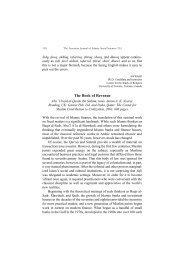Arab Tribes, the Umayyad Dynasty, and the `Abbasid ... - Epistemology
Arab Tribes, the Umayyad Dynasty, and the `Abbasid ... - Epistemology
Arab Tribes, the Umayyad Dynasty, and the `Abbasid ... - Epistemology
Create successful ePaper yourself
Turn your PDF publications into a flip-book with our unique Google optimized e-Paper software.
66 The American Journal of Islamic Social Sciences 21:4<br />
Those appointed to important provinces had tremendous administrative<br />
power <strong>and</strong> often chose members of <strong>the</strong>ir own tribes to rule smaller provinces<br />
<strong>and</strong> cities, as well as to raise <strong>and</strong> comm<strong>and</strong> armies in <strong>the</strong> wars of expansion.<br />
For example, Khalid ibn `Abd Allah al-Qasri, governor of Iraq (724-38) during<br />
Hisham’s (724-43) reign, appointed his bro<strong>the</strong>r Asad al-Qasri on two<br />
occasions (724-26 <strong>and</strong> 734-38) as governor of Khurasan. Some tribes who<br />
occupied administrative positions became extremely powerful. The best<br />
example is <strong>the</strong> Thaqafi tribe, with al-Hajjaj ibn Yusuf under `Abd al-Malik<br />
(685-705) <strong>and</strong> al-Walid I (705-15). Ano<strong>the</strong>r case was <strong>the</strong> already mentioned<br />
Yazid ibn al-Muhallab of <strong>the</strong> Azd Sou<strong>the</strong>rn tribe.<br />
In <strong>the</strong>ir administrative positions, <strong>the</strong> governors <strong>and</strong> army comm<strong>and</strong>ers<br />
gained considerably both in <strong>the</strong>ir persons <strong>and</strong> in <strong>the</strong>ir tribes. Some became<br />
so powerful <strong>and</strong> rich that <strong>the</strong>y revolted against <strong>the</strong> caliph. These rebellions<br />
were numerous, such as <strong>the</strong> one led by`Abd al-Rahman ibn al-Ash`ath.<br />
O<strong>the</strong>r governors became so powerful that <strong>the</strong> caliph removed <strong>the</strong>m before<br />
<strong>the</strong>y could challenge him <strong>and</strong> establish independent states. Examples of this<br />
are Musa ibn Nusayr’s removal in Ifriqiyah <strong>and</strong> al-Andalus, <strong>and</strong> also his<br />
client Tariq ibn Ziyad during al-Walid I’s reign. 41 `Umar II’s removal of<br />
Yazid ibn al-Muhallab can be interpreted in <strong>the</strong> same way. O<strong>the</strong>r governors<br />
were removed because of inter-tribal fighting <strong>and</strong> rivalry, such as Yazid ibn<br />
al-Muhallab, who was replaced by Qutaybah ibn Muslim. If <strong>the</strong> governors<br />
of provinces <strong>and</strong> rulers of cities belonged to <strong>the</strong> same <strong>Umayyad</strong> ruling family,<br />
<strong>the</strong>y also profited from <strong>the</strong> properties (real estate) <strong>and</strong> luxurious houses<br />
built with public money <strong>and</strong> given to members of <strong>the</strong> Marwanid family.<br />
Those chosen by <strong>the</strong> caliph or his representatives (na’ib, pl. nuwwab) in<br />
<strong>the</strong> provinces as governors (`amil, pl. `ummal) to lead military expeditions<br />
for new conquests also benefited greatly. In most cases, both <strong>the</strong> leaders <strong>and</strong><br />
<strong>the</strong>ir tribes profited from <strong>the</strong> booty . In <strong>the</strong> expansionist wars <strong>the</strong>re was, right<br />
from <strong>the</strong> outset, <strong>the</strong> promise of sharing <strong>the</strong> booty among <strong>the</strong> participants.<br />
This promise was an important incentive for <strong>Arab</strong> tribes to enroll in those<br />
campaigns. In this respect, one has to bear in mind two important issues.<br />
First, both <strong>the</strong> Nor<strong>the</strong>rn <strong>and</strong> Sou<strong>the</strong>rn tribes conducted <strong>and</strong> benefited<br />
from Islam’s expansion <strong>and</strong> conquests. Since <strong>the</strong> time of `Umar, <strong>the</strong> Qays<br />
tribes always favored new expansionist wars in order to benefit economically.<br />
The Qahtan tribes also favored Islam’s expansion <strong>and</strong> directed it<br />
toward <strong>the</strong> west. The Sou<strong>the</strong>rn tribes mainly shared with <strong>the</strong> Shu`ubiyah<br />
<strong>the</strong> projects for assimilation (i.e., acceptance <strong>and</strong> equal treatment for non-<br />
<strong>Arab</strong> converts [mawali]). It is relevant, as well, to remember that <strong>the</strong><br />
Yemenite tribes also organized <strong>and</strong> participated in expansionist wars


